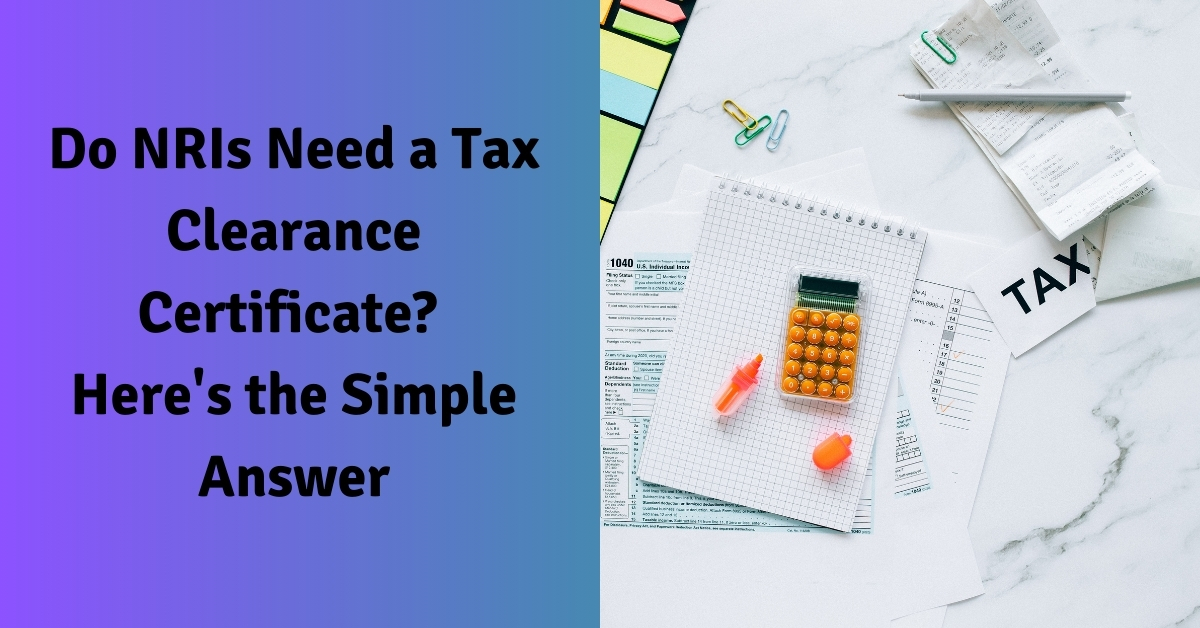Do NRIs Need a Tax Clearance Certificate? Here’s the Simple Answer

Recently, an NRI asked me if they needed a special tax document before leaving India. There’s been a lot of confusion about this, so let’s clear things up. I’ll explain what a Tax Clearance Certificate is and whether you really need one.
The tax authorities (CBDT) have made things clearer, and I’ll break it down in simple terms.
Join our exclusive NRI-only WhatsApp Community:
https://chat.whatsapp.com/EZARhvy3JkED1TF3qjL4Jy
What’s a Tax Clearance Certificate?
Think of it as a document from the tax office saying you’ve paid all your taxes under various rules:
- Regular income tax
- Wealth tax
- Gift tax
- Black money rules (which replaced some older rules in 2015)
It’s basically proof that you don’t owe any tax money to India.
Do NRIs Really Need This Certificate?
Good news – most NRIs don’t need this certificate to leave India.
What’s Changed Recently?
In the 2024 tax rules, starting October 1, 2024, the government made some changes about who needs this certificate.
Only two types of people need it:
- Those who’ve done something seriously wrong with money
- Those who owe more than ₹10 lakh in taxes (unless they’ve gotten permission to pay later)
Everyone else, including most NRIs, can travel without this paper.
Why Do Some People Need This Certificate?
The certificate makes sure that people who owe lots of tax money can’t just leave the country without paying. From October 2024, this includes money owed under the Black Money Act (which replaced some older tax rules).
How to Get the Certificate (If You Need It)
If you’re one of the few who needs this certificate:
- Go to your local tax office and fill out some forms
- You’ll need to provide:
- Your PAN card number
- Why you’re traveling
- How long you’ll be away
The tax office will check if you’ve filed your taxes properly and don’t owe money under various tax laws. If everything looks good, they’ll give you the certificate.
Conclusion
Here’s the bottom line: unless you owe lots of tax money (more than ₹10 lakh) or have done something seriously wrong with finances, you don’t need this certificate. The 2024 changes mainly affect people who owe money under the Black Money Act. Most NRIs can travel freely without worrying about this document.
FAQs’
1. Does every NRI need this tax certificate before leaving India?
Ans- No – most NRIs can leave without it. You only need it if you’ve done something seriously wrong with money or owe more than ₹10 lakh in taxes.
2. What exactly is this tax certificate?
Ans- It’s just a paper from the tax office showing you’ve paid all your taxes in India.
3. What’s new in the 2024 tax rules about this?
Ans- They added rules about the Black Money Act and made it clear who needs the certificate – mainly people with big tax debts.
4. Who exactly needs to get this certificate?
Ans- Only people who’ve done something wrong with money or owe more than ₹10 lakh in taxes.
5. Do all Indians need this certificate?
Ans- No, most people don’t need it – just those with big tax debts or financial problems.
6. What kinds of taxes does this certificate cover?
Ans- It covers regular income tax, wealth tax, gift tax, and the new black money rules.
7. What if I need it but don’t get it?
Ans- If you’re supposed to have it but don’t get it, you might not be allowed to leave India.
8. How do I apply for one if I need it?
Ans- Go to your local tax office with your PAN card and travel details.
9. When do these new rules start?
Ans- October 1, 2024.
10. Does this include money problems under the Black Money Act?
Ans- Yes, from October 2024, it includes any money you might owe under the Black Money Act.
Disclaimer: The information provided here is for educational and informational purposes only and should not be construed as financial, legal, or tax advice. Consult with a qualified professional before making any investment decisions. We do not accept any liability for errors or omissions in this information nor any direct, indirect, or consequential losses arising from its use.



